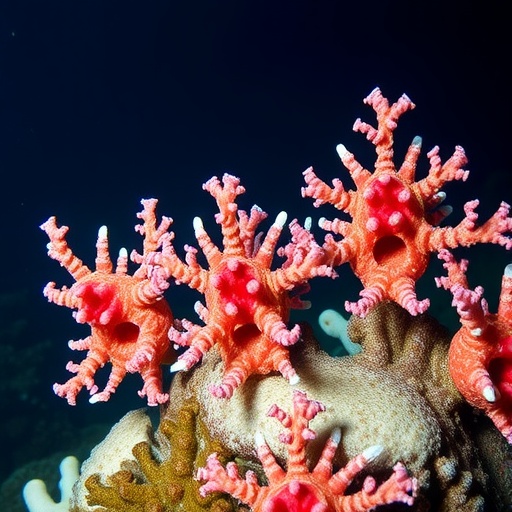Caribbean coral reefs, renowned for their vibrant biodiversity and ecological significance, face unprecedented challenges as climate change and human activities threaten their sustainability. In the quest to understand and preserve these crucial ecosystems, recent research has turned the spotlight onto a fascinating and often overlooked group of organisms: octocorals. The study titled “Caribbean octocoral communities: finding the forest for the trees?” by a team led by Lasker et al. takes an in-depth look into the structure, dynamics, and conservation status of octocoral communities within Caribbean reefs, revealing insightful findings that could reshape conservation strategies in these delicate environments.
The research team began their investigation by analyzing the complex interactions between octocorals and the surrounding coral reef ecosystem. Octocorals, commonly known as soft corals, play a vital role in maintaining reef structure and providing habitat for numerous marine species. Their flexibility and ability to thrive in various environmental conditions make them a critical component of reef resilience. However, the specific contributions of octocorals to the overall health of coral reefs have been underexplored, and this study aims to bridge that gap.
In their comprehensive review, the researchers sift through a wealth of existing literature on octocorals, consolidating information on their morphological diversity, reproductive strategies, and ecological roles. They emphasize that understanding these facets is essential for appreciating how octocorals can contribute to the resilience and recovery of coral reefs amid changing ocean conditions. Such insights could potentially inform new conservation practices that prioritize the preservation of not just corals but also these vital soft coral communities.
One of the key findings highlighted by Lasker and colleagues is the dependence of various marine organisms on octocorals for shelter and sustenance. The researchers meticulously document the diverse assemblages of fish, invertebrates, and other marine life that utilize octocoral habitats. This interdependence serves to illustrate the importance of octocorals in fostering biodiversity, which is crucial for the overall health of the marine ecosystem. The study contends that preserving octocoral communities could, therefore, enhance the resilience of coral reefs as a whole, providing a strong argument for their protection within conservation initiatives.
Furthermore, the researchers delve into the reproductive strategies of octocorals, examining how these organisms reproduce both sexually and asexually. By identifying unique mechanisms of reproduction, such as the budding process, Lasker et al. highlight the potential for octocorals to recover from disturbances faster than previously thought. This finding is especially significant in the context of climate change, where increased stressors can devastate coral populations, making the resilience of their octocoral counterparts even more critical.
In light of their discoveries, the authors propose novel strategies for managing and conserving Caribbean reefs, centering around the concept of habitat complexity. They emphasize the need to adopt a holistic approach that acknowledges the multi-layered interactions among different coral species, including both stony and soft corals. This perspective encourages a more inclusive strategy that does not solely focus on stony corals, often seen as the “stars” of the reef, but also recognizes the integral roles played by the less conspicuous octocorals.
As threats to coral reefs escalate, the study advocates for prioritizing research and conservation efforts aimed at octocoral communities. The authors call for integrated monitoring programs that assess not just stony corals but the broader context of reef biodiversity. These initiatives could potentially uncover new insights into ecosystem dynamics while contributing to the formulation of more effective conservation policies.
The implications of this research extend far beyond the Caribbean, as similar ecological principles may apply to coral reefs globally. By shining a new light on the importance of octocorals, the team hopes to inspire a paradigm shift within the scientific community towards a more comprehensive understanding of reef ecosystems. They argue that advancing our knowledge about these remarkable organisms is crucial in the face of global environmental changes and the ongoing biodiversity crisis.
Importantly, the study also discusses the potential socio-economic benefits of conserving octocoral communities. Healthy coral reefs are vital to local communities, providing fishery resources, tourism opportunities, and coastal protection. The authors stress that conserving octocorals not only helps to maintain biodiversity but also supports the economic livelihoods of many coastal populations. This powerful connection underscores the necessity of collaborative conservation efforts that encompass both ecological and human dimensions.
As the research community delves deeper into understanding the intricate web of life within coral reefs, the understanding of octocorals could lead to new strategies that enhance habitat restoration and rehabilitation efforts. The study by Lasker and colleagues serves as a crucial stepping stone towards redefining our approach to coral conservation, encouraging a view of reefs not simply as isolated entities but as interconnected systems where every species, big or small, plays a vital role.
In conclusion, the findings shared by Lasker et al. underscore the significance of octocorals in Caribbean reef ecosystems. By shedding light on their contributions, reproductive strategies, and the interconnectedness of marine life, this research opens up new avenues for conservation and restoration. Recognizing octocorals as essential components of reef health could lead to more robust, resilient ecosystems capable of withstanding the pressures of a rapidly changing ocean. As urgent as these issues are, the holistic view promoted by this research may serve as a beacon of hope for the future of coral reefs—for the ‘forest’ of octocorals that supports the ‘trees’ of stony corals, and for the myriad forms of life that depend on these vibrant underwater communities.
Subject of Research: Caribbean octocoral communities and their ecological significance
Article Title: Caribbean octocoral communities: finding the forest for the trees?
Article References:
Lasker, H.R., Bramanti, L., Edmunds, P.J. et al. Caribbean octocoral communities: finding the forest for the trees?. Coral Reefs (2025). https://doi.org/10.1007/s00338-025-02692-z
Image Credits: AI Generated
DOI: 10.1007/s00338-025-02692-z
Keywords: octocorals, coral reefs, biodiversity, conservation, Caribbean, ecosystem dynamics, resilience, reproductive strategies




